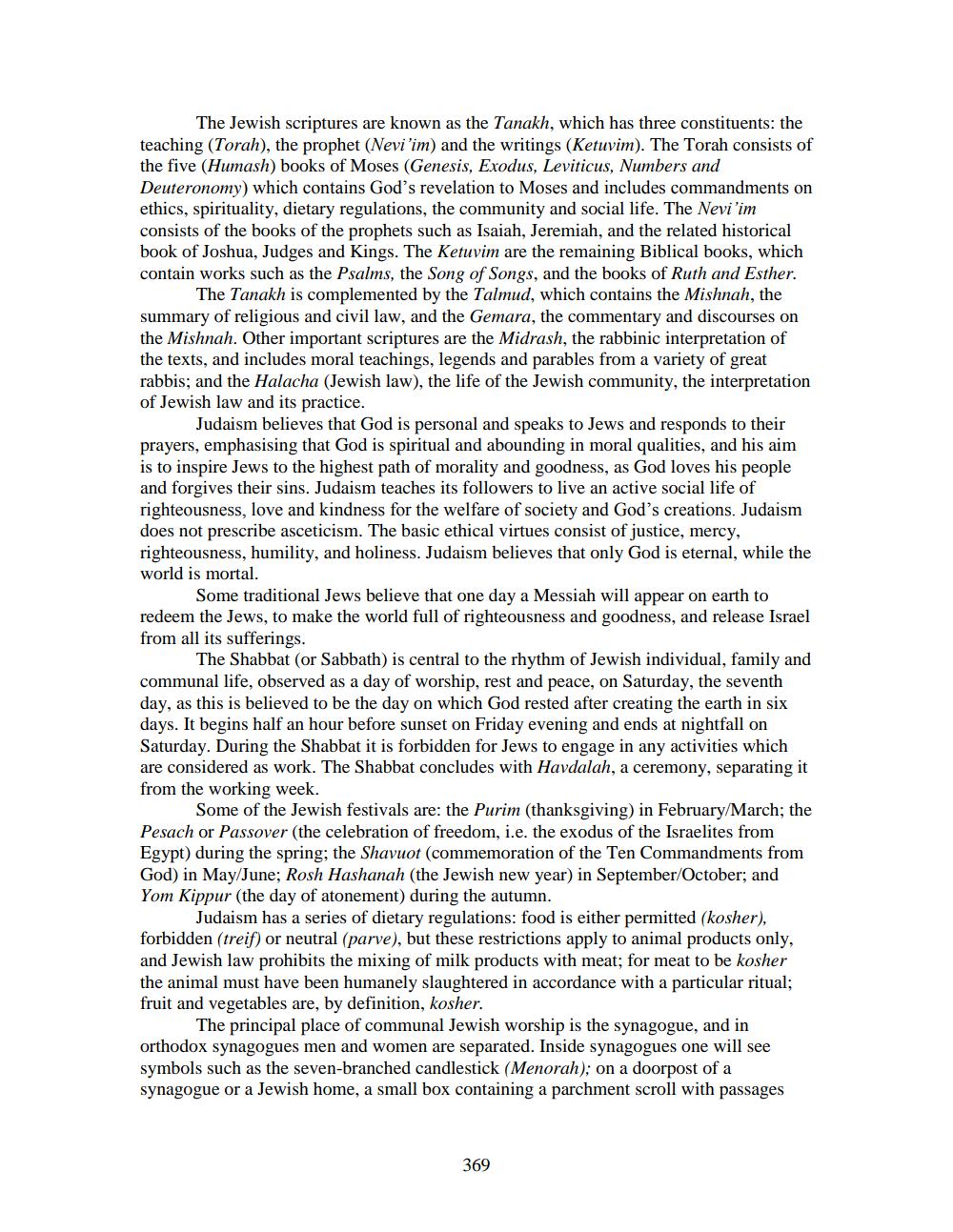________________
The Jewish scriptures are known as the Tanakh, which has three constituents: the teaching (Torah), the prophet (Nevi 'im) and the writings (Ketuvim). The Torah consists of the five (Humash) books of Moses (Genesis, Exodus, Leviticus, Numbers and Deuteronomy) which contains God's revelation to Moses and includes commandments on ethics, spirituality, dietary regulations, the community and social life. The Nevi'im consists of the books of the prophets such as Isaiah, Jeremiah, and the related historical book of Joshua, Judges and Kings. The Ketuvim are the remaining Biblical books, which contain works such as the Psalms, the Song of Songs, and the books of Ruth and Esther. The Tanakh is complemented by the Talmud, which contains the Mishnah, the summary of religious and civil law, and the Gemara, the commentary and discourses on the Mishnah. Other important scriptures are the Midrash, the rabbinic interpretation of the texts, and includes moral teachings, legends and parables from a variety of great rabbis; and the Halacha (Jewish law), the life of the Jewish community, the interpretation of Jewish law and its practice.
Judaism believes that God is personal and speaks to Jews and responds to their prayers, emphasising that God is spiritual and abounding in moral qualities, and his aim is to inspire Jews to the highest path of morality and goodness, as God loves his people and forgives their sins. Judaism teaches its followers to live an active social life of righteousness, love and kindness for the welfare of society and God's creations. Judaism does not prescribe asceticism. The basic ethical virtues consist of justice, mercy, righteousness, humility, and holiness. Judaism believes that only God is eternal, while the world is mortal.
Some traditional Jews believe that one day a Messiah will appear on earth to redeem the Jews, to make the world full of righteousness and goodness, and release Israel from all its sufferings.
The Shabbat (or Sabbath) is central to the rhythm of Jewish individual, family and communal life, observed as a day of worship, rest and peace, on Saturday, the seventh day, as this is believed to be the day on which God rested after creating the earth in six days. It begins half an hour before sunset on Friday evening and ends at nightfall on Saturday. During the Shabbat it is forbidden for Jews to engage in any activities which are considered as work. The Shabbat concludes with Havdalah, a ceremony, separating it from the working week.
Some of the Jewish festivals are: the Purim (thanksgiving) in February/March; the Pesach or Passover (the celebration of freedom, i.e. the exodus of the Israelites from Egypt) during the spring; the Shavuot (commemoration of the Ten Commandments from God) in May/June; Rosh Hashanah (the Jewish new year) in September/October; and Yom Kippur (the day of atonement) during the autumn.
Judaism has a series of dietary regulations: food is either permitted (kosher), forbidden (treif) or neutral (parve), but these restrictions apply to animal products only, and Jewish law prohibits the mixing of milk products with meat; for meat to be kosher the animal must have been humanely slaughtered in accordance with a particular ritual; fruit and vegetables are, by definition, kosher.
The principal place of communal Jewish worship is the synagogue, and in orthodox synagogues men and women are separated. Inside synagogues one will see symbols such as the seven-branched candlestick (Menorah); on a doorpost of a synagogue or a Jewish home, a small box containing a parchment scroll with passages
369




